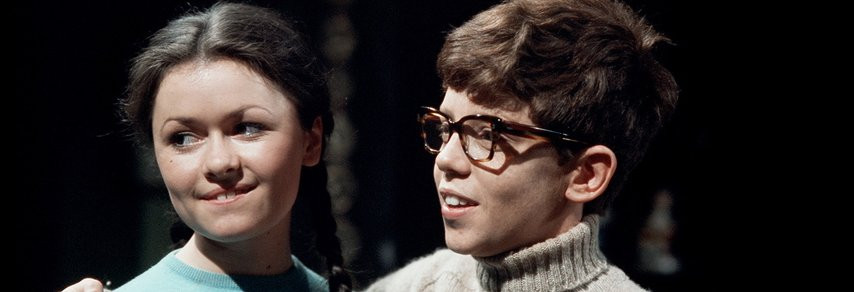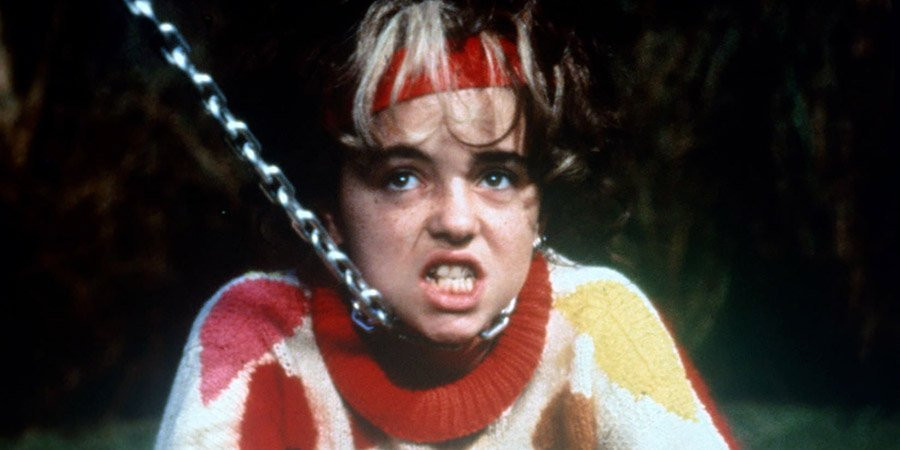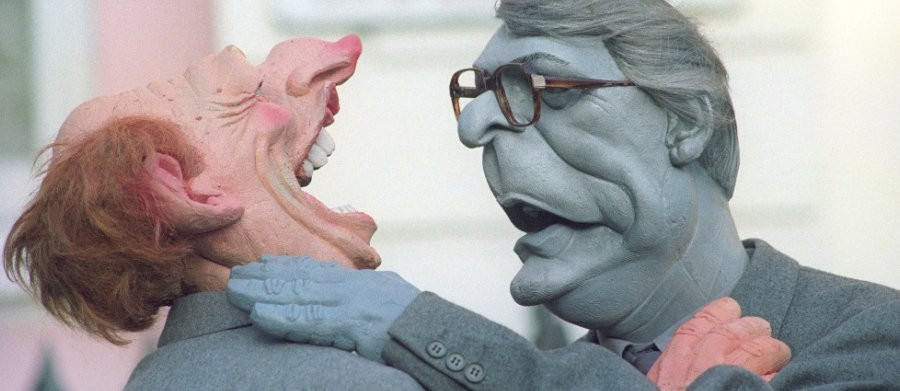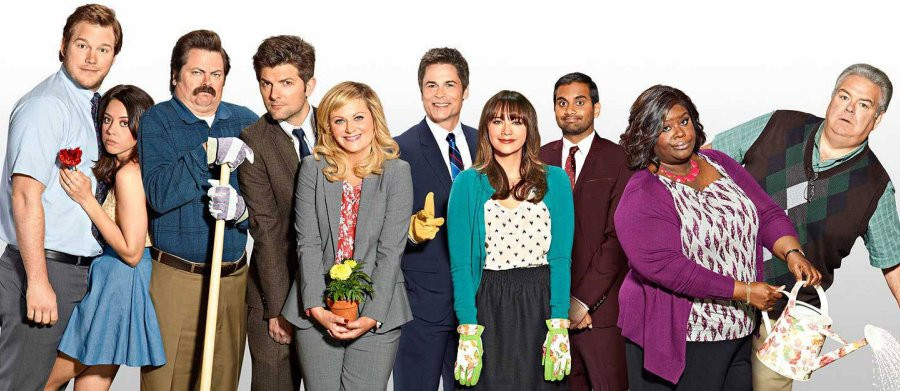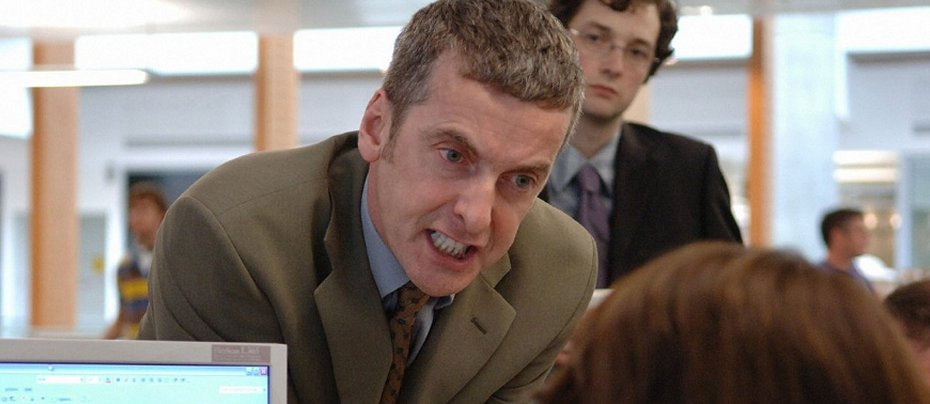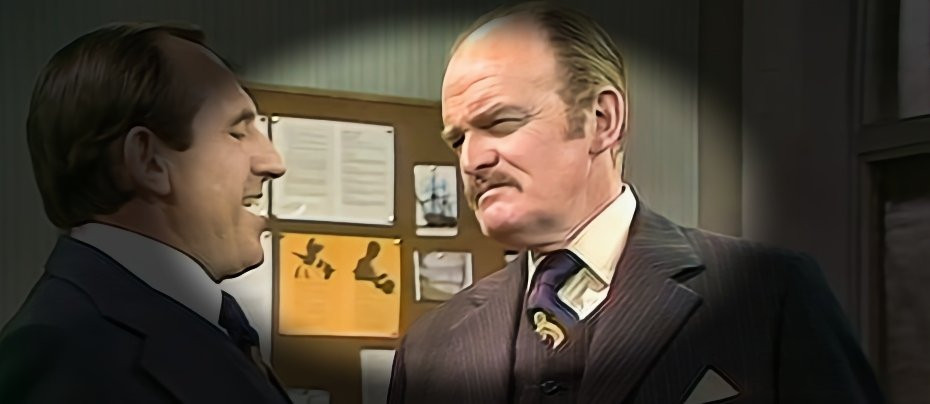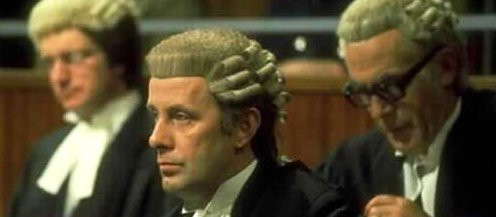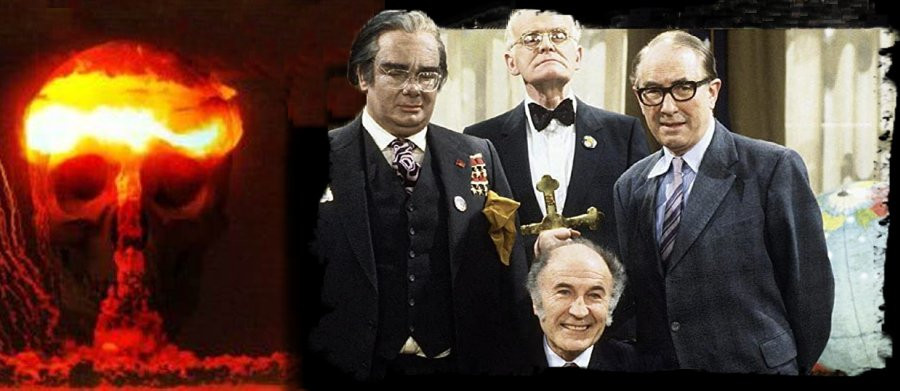
Whoops Apocalypse
1982 - United KingdomReview: John Winterson Richards
Whether or not one believes he deserves it, there is no denying that the image of President Donald Trump in entertainment programmes on television - we are not talking about news or current affairs here - is uniformly very negative. The best example, in every sense, is Alec Baldwin's hilarious portrayal on Saturday Night Live. There are two themes common to most of these negative references: first, Mr Trump is supposed to be very stupid; and, second, he is presented as a dangerous extremist.
Remember those two points - very stupid and dangerous extremist. This is not about whether it is fair or accurate to apply them to Mr Trump. This is just a television review, after all. The point here is that, because people tend to watch a lot more entertainment than news or current affairs, it is the images of public figures presented by the entertainment media that tend to stick in most people's minds.
So it might comfort anyone frightened by those images today to know that this has happened before. The same entertainment media were just as negative about two other recent American Presidents, George W Bush and Ronald Reagan - there seems to be a pattern here - on exactly the same grounds. Both were presented consistently as very stupid and dangerous extremists.
Yet, regardless of one's opinions of their respective Administrations, it is simply inaccurate to suggest than either man was of low intelligence. Mr Bush is one of only two American Presidents with degrees from two Ivy League Universities, while Mr Reagan had the reputation of being a smart political operator long before he became President. In addition, far from being fanatics, both were pragmatists with records of bipartisan deal making astonishing by the standards of today's deeply divided America. These are verifiable facts. However, in both cases it is the image of stupidity and extremism that remains in the public mind to this day, thanks to the entertainment media.
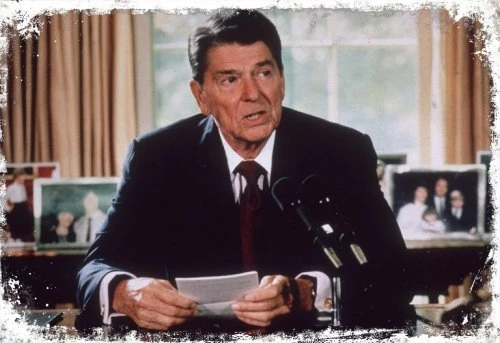
With Reagan in particular, the impact of this negative image was heightened by the climate of fear in the West as the Cold War entered its decisive final phase. The anxiety felt by many today about the likes of coronavirus and climate change is nothing compared with the universal paranoia that prevailed throughout the 1960s, 70s, and 80s from knowing that we were at every moment only minutes away from the possible self annihilation of the entire human race.
Happily - spoiler alert - that never occurred, so the satirical comedy Whoops Apocalypse is today no more than a curiosity, a strange evocation of a mindset now long gone but once generally prevalent. The show came out in 1982, the year after Reagan became President. At that point the British media were still obsessed with the fact that he had co-starred with a chimpanzee in the feature 'Bedtime for Bonzo,' and rather ignored the fact that he had also been a very effective union leader (a fairly left wing one at the time) who had gone on to be elected to two terms as Governor of America's most populous state.
So in Whoops Apocalypse Ronnie Reagan becomes Johnny Cyclops, a US President previously most famous as the star of a series of Tarzan films - and therefore another chimp's co-star. He was played with bewildered charm by the ubiquitous Canadian Barry Morse, who is probably best remembered for his roles in The Fugitive and Gerry Anderson's Space 1999.
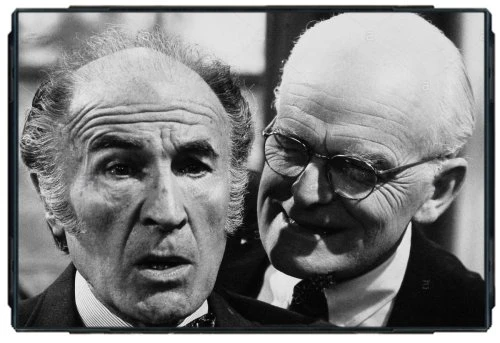
Cyclops is well meaning but rather dim and obviously well out of his depth. He is at the mercy of his handlers, above all a religious fundamentalist known simply as "The Deacon," played to perfection by John Barron, the immortal C J from The Fall and Rise of Reginald Perrin. Imposing in every sense, Barron's Deacon dominates poor Cyclops - who becomes a likeable and even poignant character by comparison. Incidentally, Barron was at the time President of Equity, the British equivalent of the Screen Actors' Guild, the American union of which Reagan was President at the start of his political career.
The best sequence is an assassination attempt staged by "The Deacon" in an attempt to revive Cyclops' dire popularity rating. Since this was filmed not long after Reagan's own very serious injury at the hands of a would-be assassin, it would probably be considered distasteful today, but is still very funny. On that occasion, Reagan did indeed see an increase in his popularity, due in large part to his personal courage and good humour on the point of death. While Reagan made spontaneous jokes, Whoops Apocalypse has a couple of Presidential gag writers riding in the ambulance with Cyclops trying to work on new material with him while he is in pain.
In the end, Cyclops blows his lines and, in any case, all public sympathy is lost when his speeding ambulance runs over his popular Democratic challenger.
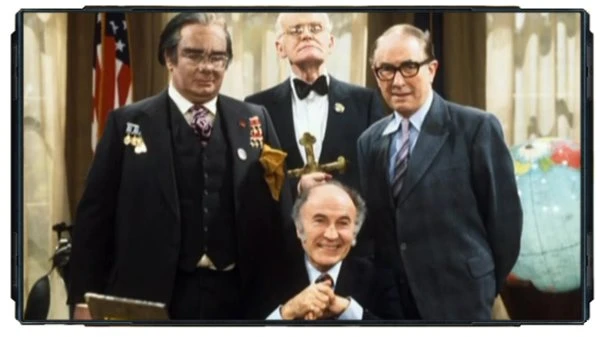
Another comic highlight that would be censored these days is Cyclops' jaw dropping campaign song, to a tune very similar to the Disney 'Ballad of Davy Crockett,' sung by a young Rik Mayall: "Johnny, Johnny, Cyclops, never started World War Three..."
Except, of course, he does. This comes about through the interweaving of several different story threads, of which the Cyclops one is the most important, the most memorable, and easily the most amusing.
Another has an exiled young Shah supported only by an unreliable parrot and a servant who insists on only serving him blindfold lest he be blinded by his radiance. Over in Russia, the gerontocracy is led by Richard Griffiths, convincing as a Brezhnev clone, while Alexei Sayle is as subtle as ever as KGB torturer Commissar Solzhenitsyn, who is at perpetual pains to point out that he is "no relation."
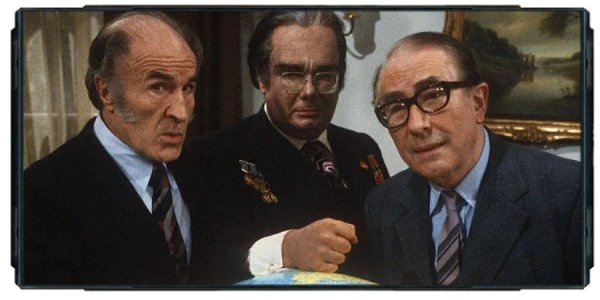
In a rare example of equal opportunity satire, the left is also savaged by having the Labour Party, then under the left wing Michael Foot, win power in Britain - which was, it is often forgotten, actually quite a possibility when the series was filmed, before the Falklands War, and when the Thatcher Ministry was at the height of its unpopularity due to its tough economic policies having many negative, and as yet few positive, effects. In Whoops Apocalypse, the new Labour Prime Minister is Kevin Pork, played by the veteran Peter Jones. Pork is able to offer a clear response to the difficult question of how Britain will be defended after implementation of his/Foot's policy of unilateral disarmament - by his superpowers, of course!
Another actor with Gerry Anderson connections, expatriate American Ed Bishop from UFO, cements everything together as a fast talking newsreader.
Finally, there is Lacrobat, a "celebrity terrorist" and master of disguise, apparently, but clearly very loosely, based on "Carlos the Jackal," a gunman whose exaggerated exploits were the subject of considerable speculation at the time. He is played by John Cleese, no less, and so the whole show is worth watching just for him.
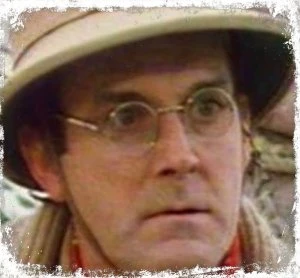
His most memorable scene occurs when he is stopped by a traffic policeman while transporting a terrifying "quark bomb," formerly known as a "Johnny Cyclops bomb," disguised as a large statue of a certain part of the male anatomy. He offers to cover it up but all he has is a sweater that might just cover the tip - setting up the policeman for the best line in the whole series.
The multi-layered and sophisticated script from Andrew Marshall and David Renwick offered a lot of such moments. The jokes came thick and fast, and if one did not land, there would be another along in a moment. The style of humour seems to be influenced by 'Airplane,' and indeed resembles the much loved but short lived television series Police Squad!, from the writers of 'Airplane,' which was shown later the same year. If there is any criticism in this it is that, like Police Squad, it may be that Whoops Apocalypse tried to do too much in a short time. Some of the strands worked better than others and there are dull patches.
ITV seem to have put a lot of money into the production, and the cast had great strength in depth. Star spotters should look out for the likes of Geoffrey Palmer, Charles Kay, and Welsh character actor Richard Davies in supporting roles.
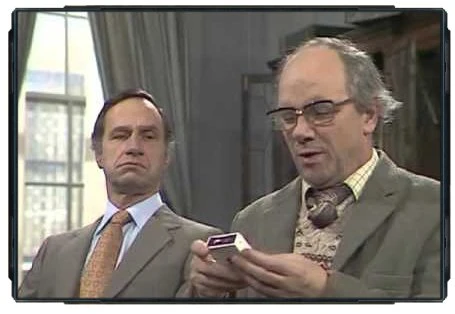
The series had sufficient impact for Marshall and Renwick to remake it as a full feature film in 1986, but most of the cast and characters were changed, as was the plot. It was not a great success. The same year they launched Hot Metal, a more focused satirical series on the British media that showed that they had learned a lot from their mistakes in Whoops Apocalypse.
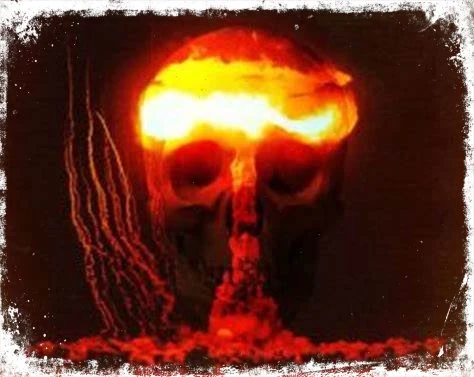
Meanwhile, in real life, the song was right: Johnny Cyclops never started World War Three. He won the Cold War by initiating an arms race he knew the Soviet system could not win and then - ever the pragmatist - gave that system a soft landing through conciliatory diplomacy. So a situation most of us assumed would end badly ended with an unexpected victory that was unexpectedly peaceful. Very few of us would have predicted that in 1982. Cyclops did.
Yet still most people remember him as the President who co-starred with a chimpanzee. Such is the power of television.
Seen this show? How do you rate it?
Seen this show? How do you rate it?
Published on June 2nd, 2020. Written by John Winterson Richards for Television Heaven.


